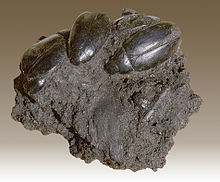Hydrophilus is a genus of beetles in the family Hydrophilidae, the water scavenger beetles. There are 53 species in three subgenera in the genus: Hydrophilus, Dibolocelus, and Temnopterus.[1][2][3][4][5][6][7]
| Hydrophilus | |
|---|---|

| |
| Hydrophilus piceus | |
| Scientific classification | |
| Domain: | Eukaryota |
| Kingdom: | Animalia |
| Phylum: | Arthropoda |
| Class: | Insecta |
| Order: | Coleoptera |
| Family: | Hydrophilidae |
| Tribe: | Hydrophilini |
| Genus: | Hydrophilus Geoffroy, 1762 |

List of species
editSubgenus Dibolocelus
- Hydrophilus gibbosus (Régimbart, 1901)
- Hydrophilus harpe Short and McIntosh, 2015
- Hydrophilus iricolor (Régimbart, 1901)
- Hydrophilus masculinus (Régimbart, 1901)
- Hydrophilus nucleoensis Arce-Pérez & Arriaga-Varela, 2021[6]
- Hydrophilus oberthueri (Régimbart, 1901)
- Hydrophilus ovatus Gemminger and Harold 1868
- Hydrophilus palpalis Brullé, 1838
- Hydrophilus pollens Sharp, 1887
- Hydrophilus pseudovatus Arce-Pérez & Arriaga-Varela, 2021[6]
- Hydrophilus purpuracens (Régimbart, 1901)[6]
- Hydrophilus smaragdinus Brullé, 1837
- Hydrophilus violaceonitens Jacquelin du Val, 1857[6]
Subgenus Hydrophilus
- Hydrophilus acuminatus Motschulsky, 1853
- Hydrophilus albipes Castelnau, 1840
- Hydrophilus aterrimus (Eschscholtz, 1822)
- Hydrophilus australis Montrouzier, 1860
- Hydrophilus bedeli (Régimbart, 1901)
- Hydrophilus bilineatus (MacLeay, 1825)
- Hydrophilus brevispina Fairmaire, 1879
- Hydrophilus cavicrus (Kuwert, 1893)
- Hydrophilus cavisternum (Bedel, 1891)
- Hydrophilus dauricus Mannerheim, 1852
- Hydrophilus ensifer Brullé, 1837
- Hydrophilus flavicornis Castelnau, 1840
- Hydrophilus foveolatus (Régimbart, 1901)
- Hydrophilus guarani (Bachmann, 1966)
- Hydrophilus hackeri (Orchymont, 1937)
- Hydrophilus hastatus (Herbst, 1779)
- Hydrophilus indicus (Bedel, 1891)
- Hydrophilus infrequens Watts, 1988
- Hydrophilus insularis Laporte de Castelnau, 1840
- Hydrophilus latipalpus Castelnau, 1840
- Hydrophilus loriai (Régimbart, 1901)
- Hydrophilus macronyx (Régimbart, 1901)
- Hydrophilus mesopotamiae (Kniz, 1914)
- Hydrophilus novaeguineae Watts, 1988
- Hydrophilus olivaceus Fabricius, 1781
- Hydrophilus pedipalpus (Bedel, 1891)
- Hydrophilus piceus (Linnaeus, 1758) – great silver water beetle
- Hydrophilus pistaceus Laporte de Castelnau, 1840
- Hydrophilus regimbarti (Zaitzev, 1908)
- Hydrophilus rufocinctus (Bedel, 1891)
- Hydrophilus senegalensis (Percheron, 1835)
- Hydrophilus simulator (Bedel, 1891)
- Hydrophilus sternitalis (Reitter, 1906)
- Hydrophilus temnopteroides (Orchymont, 1913)
- Hydrophilus triangularis Say, 1823 – giant water scavenger beetle
- Hydrophilus unguicularis (Régimbart, 1901)
- Hydrophilus wattsi Hansen, 1999
Subgenus Temnopterus
- Hydrophilus aculeatus (Solier, 1834)
- Hydrophilus rufomarginatus Hansen, 1999
References
editWikimedia Commons has media related to Hydrophilus.
- ^ Fikacek, M.; Hajek, J.; Prokop, J. (2008). "New record of the water beetles (Coleoptera: Dytiscidae, Hydrophilidae) from the central European Oligocene-Miocene deposits, with a confirmation of the generic attribution of Hydrobiomorpha enspelense Wedmann 2000" (PDF). Annales de la Société Entomologique de France. 44 (2): 187–199. doi:10.1080/00379271.2008.10697555. S2CID 51348060. Archived from the original (PDF) on September 22, 2014. Retrieved March 2, 2014.
- ^ "Hydrophilus Geoffroy, 1762". Integrated Taxonomic Information System. Retrieved July 26, 2015.
- ^ Hansen, M. (1991). "The hydrophilid beetles: phylogeny, classification and a revision of the genera (Coleoptera, Hydrophiloidea)". Biologiske Skrifter. 40. ISBN 87-7304-226-9. ISSN 0366-3612.
- ^ "Hydrophilus Müller, 1764". BioLib.
- ^ Short, A. E.Z.; Fikåček, M. (2011). "World catalogue of the Hydrophiloidea (Coleoptera): additions and corrections II (2006-1010)" (PDF). Acta Entomologica Musei Nationalis Pragae. 51 (1): 83–122. Archived from the original (PDF) on August 13, 2015.
- ^ a b c d e Hansen, Michael (1999). World Catalogue of Insects Volume 2: Hydrophiloidea (s. str.) (Coleoptera). Stenstrup: Apollo Books. ISBN 8788757315.
- ^ Arce-Pérez, Roberto; Arriaga-Varela, Emmanuel; Novelo-Gutiérrez, Rodolfo; Navarrete-Heredia, Josè L. (2021). "Giant water scavenger beetles Hydrophilus subgenus Dibolocelus (Coleoptera: Hydrophilidae) from Mexico with description of two new species". Zootaxa. 5027 (3): 387–407. doi:10.11646/ZOOTAXA.5027.3.5.